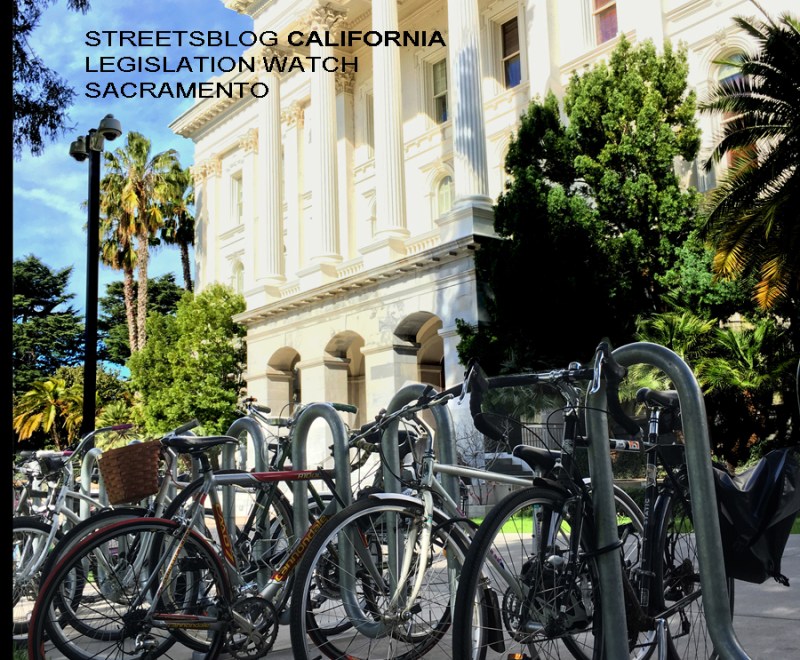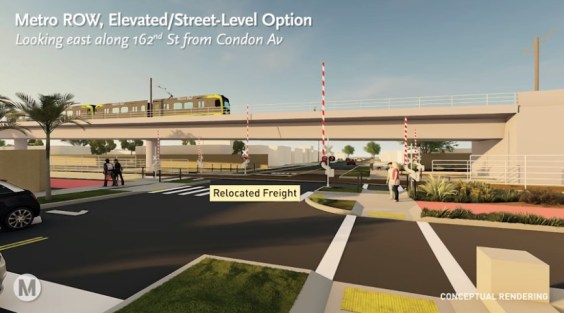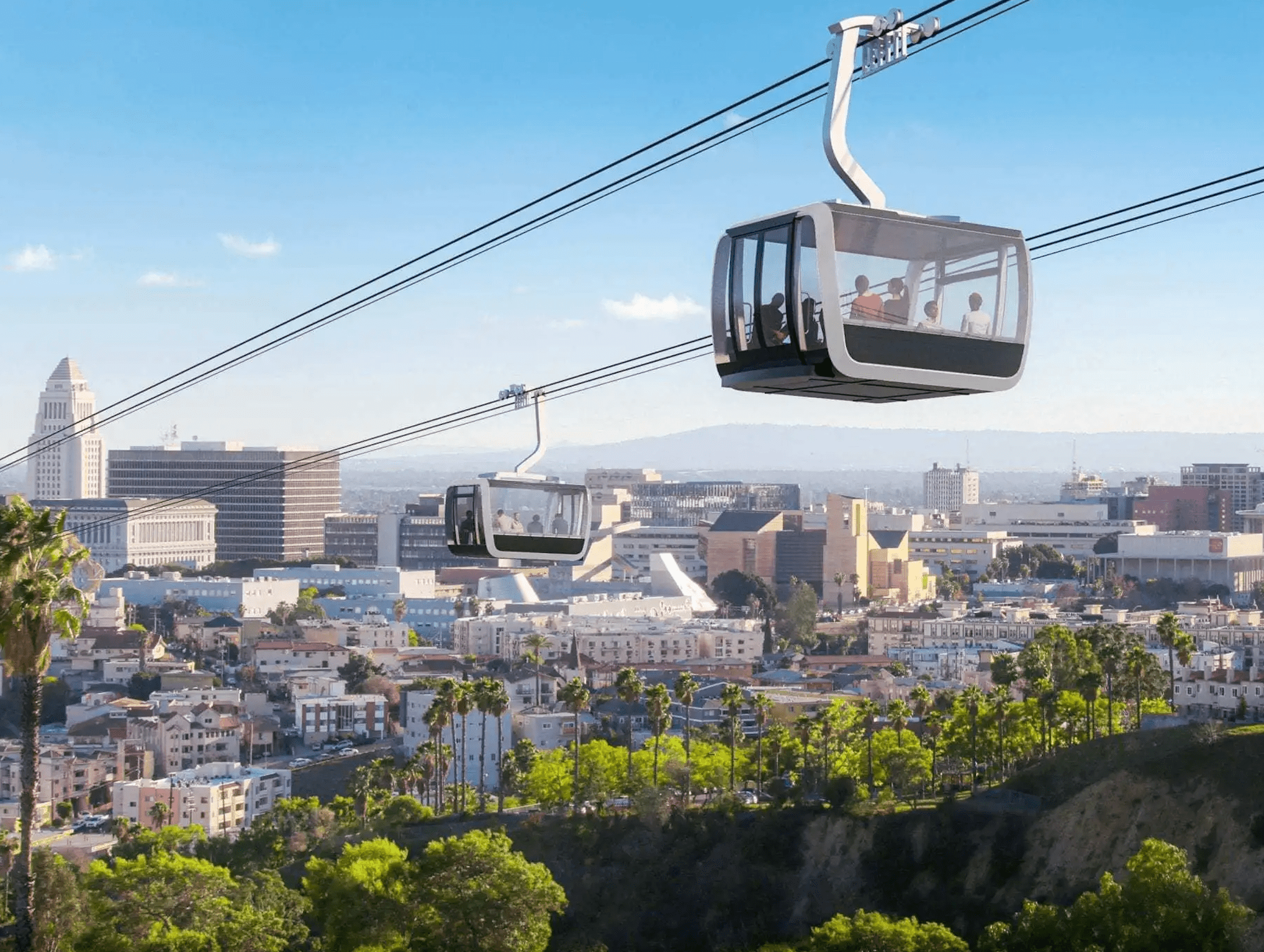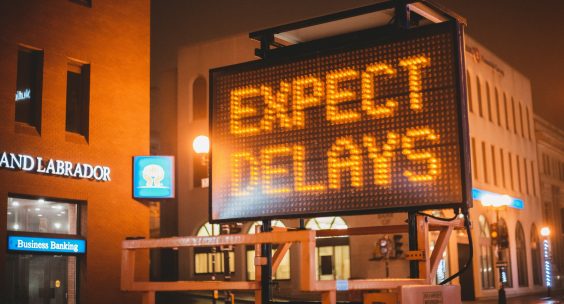Transportation Committee Hears Bills: Active Transpo, High-Speed Rail, More
4:35 PM PDT on April 12, 2016
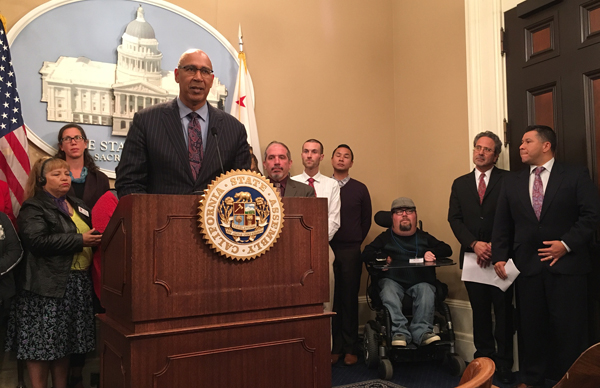
A marathon hearing in the Assembly Transportation Committee yesterday was a sign of looming deadlines in the California legislature. It was also an illustration of the strange and sometimes surreal world in which California's laws are debated and created.
An hour before the hearing, a coalition of groups working on equity and transportation presented a package of bills at a press conference. At the time, the press was downstairs watching Governor Brown sign the minimum wage bill, but upstairs the room was packed with supporters, a group of whom had driven all the way from Fresno. Assemblymembers Chris Holden (D-Pasadena), Richard Bloom (D-Santa Monica), and Eduardo Garcia (D-Coachella) presented bills aimed at improving transportation options for people who need the most help, including creating a free transit pass program, increasing funding for the Active Transportation Program, and providing representation for disadvantaged communities on the California Transportation Commission.
Some of those transportation equity bills were among the 22 bills the Transportation Committee heard and discussed over the course its five-plus-hour hearing yesterday afternoon. The Transportation Committee meets next week to consider additional legislation. That promises to be another long hearing as the committee works through a large number of bills in a few short weeks.
HIGH-SPEED RAIL
Among the bills heard yesterday were attempts by Republicans to stop California's high-speed rail project (CAHSR). These bring the total to eleven such efforts, according to Keith Dunn, a consultant for the Association for California High-Speed Trains, who testified at the hearing. These bills, like earlier similar bills, received few votes. They may well crop up again, but for now they are dead in the water.
This time around the anti-high-speed rail bills were:
- A.B. 1717: Since the High-Speed Rail Authority changed its plans and decided to build towards the Bay Area first, rather than to L.A., Assemblymember David Hadley (R-Torrance) proposed that CAHSR's Greenhouse Gas Reduction Fund money be taken away and given to other rail projects.
- A.B. 1768: High-speed rail is a waste of money and the bonds currently used for it should be used instead to repair roads and highways, said Assemblymember James Gallagher (R-Plumas Lake).
- A.B. 2049: Assemblymember Melissa Melendez (R-Lake Elsinore) wrote pretty much the same bill as Gallagher's.
- A.B. 1866: Assemblymember Scott Wilk (R-Santa Clarita) wants the high-speed rail bonds to be taken away and spent on water projects.
SPECIALIZED LICENSE PLATES
Three bills heard in yesterday's meeting aimed to create a specialized license plate program to raise money for specific causes. Such bills have run into trouble in the past, with a moratorium on their proliferation causing hard feelings between legislators about pet causes. Committee Chair Jim Frazier (D-Oakley) warned that not only do the bills face an uphill battle, but their effectiveness as fundraising strategies is questionable: several past such attempts, he said, did not get enough applicants to start production of the particular specialized plate.
Nonetheless, the committee passed two of them: a “bicycle pathways” plate with proceeds going to the Active Transportation Program (A.B. 2303, Holden), and another that would support local food banks (A.B. 2131, Maienschein).
A third bill, to create a plate with the motto “In God We Trust,” led to a strange discussion that highlighted some deep cracks between the two parties. A.B. 2253 was proposed and supported by Republican members, who are very much in the minority in California's legislative chambers, and their emotional response to testimony against the bill was striking. The bill was ultimately shot down because its proceeds were slated for a private organization, the discriminatory policies of which were called into question by several witnesses. Thus the committee sidestepped the question of the appropriateness—and legality—of putting a religious motto on a state-sanctioned plate.
ACTIVE TRANSPORTATION
In contrast, most of the bills that encouraged active transportation generated no controversy. The exception was A.B. 2509, a bill from Assemblymember Phil Ting (D-San Francisco) that would clarify current law that allows bicyclists to ride side by side. It specifically states that riding side by side within a bike lane is okay. The clarification is clearly needed, since it was obvious from their questions that several of the assemblymembers had trouble understanding what the bill was about.
“What is the need for this?” asked Assemblymember Catharine Baker (R-San Ramon). “Isn't it dangerous?” She spoke of curvy mountain roads in her district, and of bicyclists who got in the way of drivers racing along them. Assemblymember Devon Mathis (R-Visalia) also expressed concern that the bill would create new dangers on high-speed roads.
After repeating that current law does not prohibit riding side by side, and that the “slow vehicle” law already in place applies to bicycles, Jeanie Ward-Waller of the California Bicycle Coalition responded to their safety concerns. “In many communities, there are some people who have no choice [but to ride on high-speed roads],” she said. “What are we supposed to tell them?”
In the end, the bill passed with two votes against, but the discussion revealed a great need to educate non-cyclists about what it is really like to use a bicycle.
By the time Christopher Holden introduced his transit pass bill, A.B. 2222, 5 p.m. had come and gone. Even so, a long line of people stood up to speak in support, including advocates for biking and walking, health, environmental, and justice issues. The bill proposes using Greenhouse Gas Reduction Funds to provide free transit passes for students and low-income people, and supporters were eager to talk about their personal experience. For example, several students—from Santa Monica, Fresno, Sonoma, and Humboldt—said that without transit passes they would not have been able to succeed in school. Josh Stark of TransForm pointed out that a free transit pass program could encourage people to use transit and also support transit agencies so they can improve services, thus aligning with statewide greenhouse gas reduction goals by reducing driving.
Saying he would support the bill, Committee Chair Frazier quipped to Assemblymember Holden: “I wish I had a following like yours,” as the parade of supporters returned to their seats.
At the tired tail end of the evening, Richard Bloom's active transportation bill, A.B. 2796, passed unanimously. The bill requires that a percentage of Active Transportation Program (ATP) funds be allocated for planning and programming in disadvantaged communities. “We are trying to address the declining amount of money for planning under the Active Transportation Program,” said Bloom. “That puts disadvantaged communities, already short on funds, further at a disadvantage when they compete for ATP grants.”
Bill Sadler of the Safe Routes to Schools National Partnership, speaking in support of the bill, pointed out the importance of providing funds for more than just infrastructure. “Planning helps you identify your infrastructure needs,” he said.
Many other bills were discussed at the hearing, and more will be debated at next week's hearing. Streetsblog CA will continue covering these bills through the legislative process.
Streetsblog California editor Melanie Curry has been thinking about transportation, and how to improve conditions for bicyclists, ever since commuting to school by bike long before bike lanes were a thing. She was Managing Editor at the East Bay Express, editor of Access Magazine for the University of California Transportation Center, and earned her Masters in City Planning from UC Berkeley.
Stay in touch
Sign up for our free newsletter
More from Streetsblog California
Legislators Tackle AV, School Zone Safety
Are AVs freight trucks ready to be deployed on California roads with no one in them?
Metro Looks to Approve Torrance C Line Extension Alignment
Selecting the relatively low-cost hybrid alternative should help the oft-delayed South Bay C Line extension move a step closer to reality
What to Say When Someone Claims ‘No One Bikes or Walks in Bad Weather’
Yes, sustainable modes are more vulnerable to bad weather. But that's why we should invest more in them — not less.
Wednesday’s Headlines
Road project leaves Half Moon Bay residents without access; Kern County residents concerned about a carbon capture plan; Who works from home in the Bay Area? More
SEE IT: How Much (Or How Little) Driving Is Going on in America’s Top Metros
Check it out: The lowest-mileage region isn't the one you'd think.
